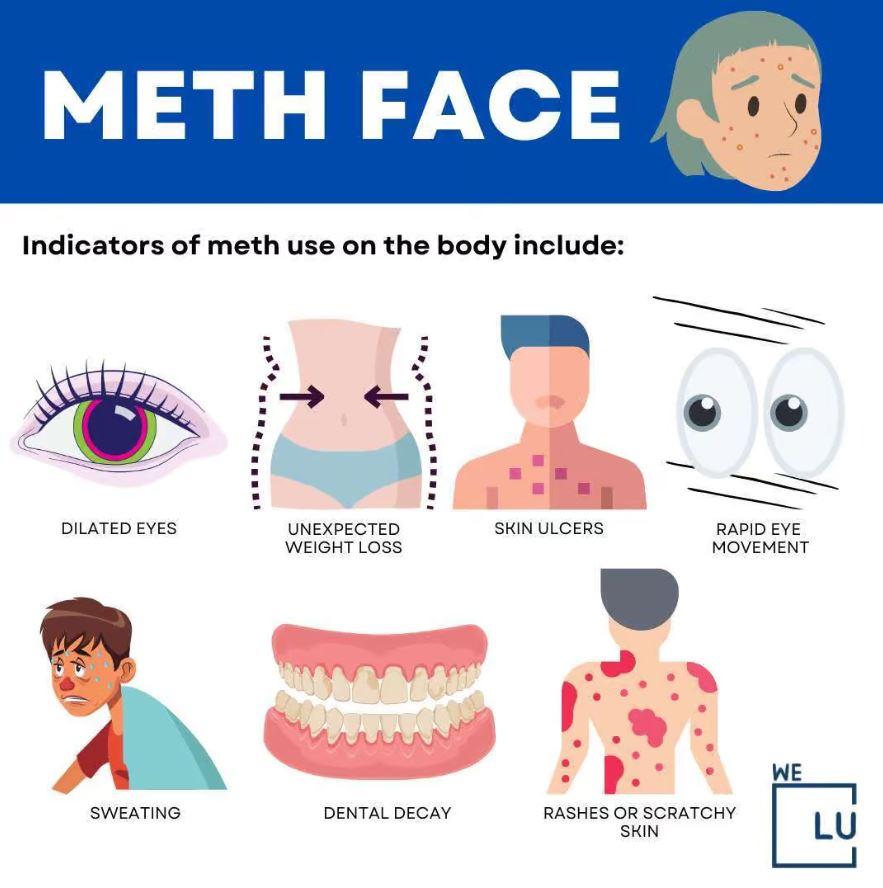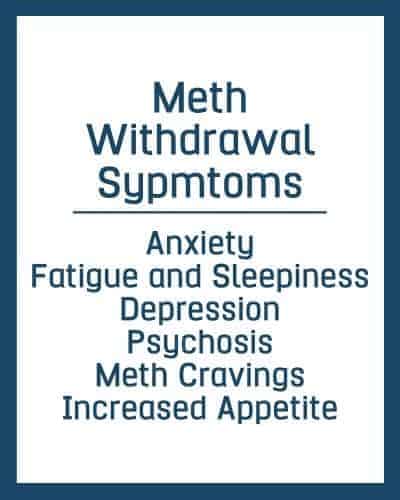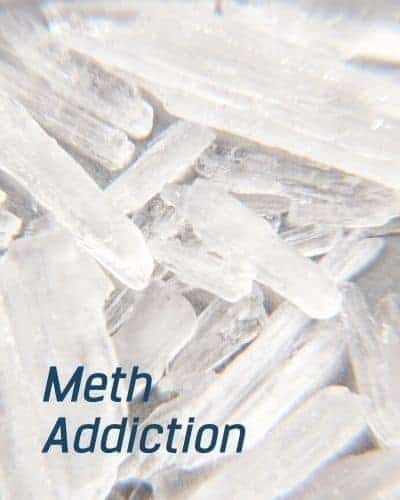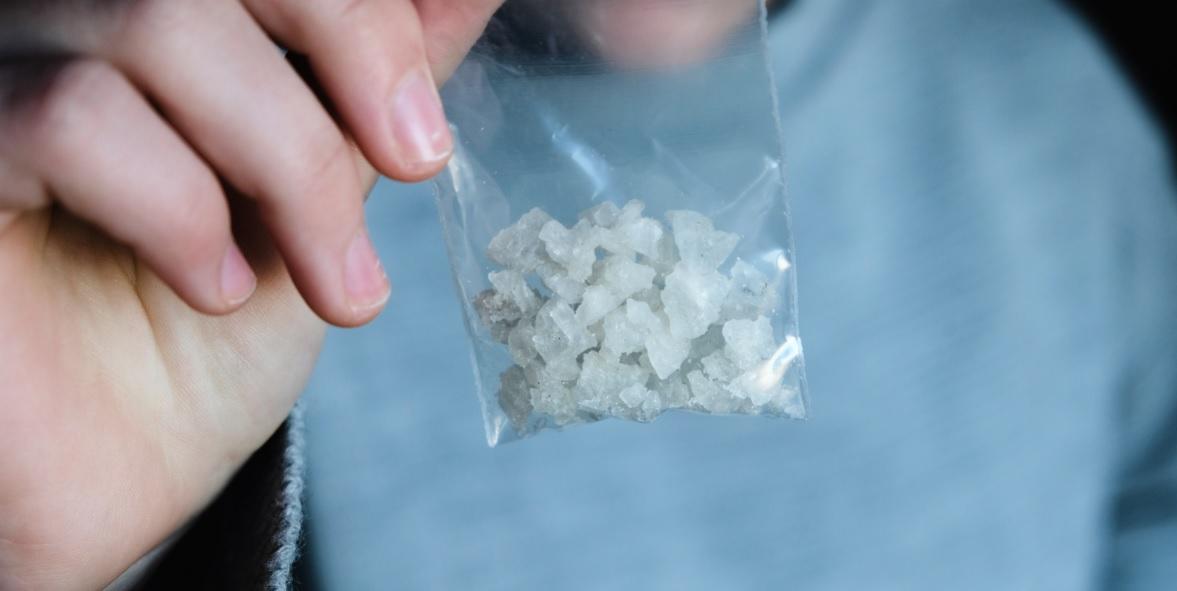What Does Meth Feel Like?
Methamphetamine, commonly known as meth, is a powerful stimulant drug that intensely affects the mind and body. When someone uses meth, they may experience intense pleasure, increased energy, and heightened focus.
The drug stimulates the release of dopamine, a neurotransmitter associated with feelings of reward and pleasure, resulting in an intense and euphoric sensation. However, these initial pleasurable effects are often followed by negative consequences and potential physical and psychological health risks.
Understanding the subjective experience of using meth is essential in comprehending meth addiction and the dangers of this highly habit-forming substance.
The Stages Of The Meth Feeling & Experience
The experience of using methamphetamine can be broken down into several stages, each characterized by distinct feelings and effects.
These stages may vary among individuals, and the intensity and duration of each stage can depend on factors such as the dose taken, the method of administration, and individual tolerance.
Meth Rush
The first stage of the meth experience is often called the rush or flash. It occurs immediately after taking the drug and is characterized by the following:
- Intense and pleasurable euphoria.
- Increased energy.
- Heightened alertness.
- Users may feel a sense of invincibility, confidence, and a surge of motivation.
- A rapid heartbeat, increased blood pressure, and dilation of the pupils can accompany the rush.
Meth Highs/Euphoria
What does a meth high feel like? Following the rush, the high or euphoria stage sets in. Users experience intense pleasure, heightened focus, and increased sociability. Methamphetamine stimulates dopamine release in the brain, resulting in the pleasurable effects. Users may feel a surge of energy, increased self-confidence, and enhanced sensory perception.
Plateau Stage
Users often enter a plateau stage after the initial rush and high. The intensity of the euphoric effects subsides, and the user may experience:
- A sustained but less intense sense of well-being.
- Increased alertness.
- A reduced need for sleep.
The plateau stage can last for several hours, during which individuals may engage in hyperactive and repetitive behaviors, experience increased talkativeness, and have an elevated sex drive.
Coming Down From Meth/Meth Crash
As the effects of methamphetamine begin to wear off, users enter the coming down or crash stage. This stage is characterized by the following:
- A rapid decline in energy.
- Feelings of exhaustion
- Irritability.
- Depression.
- Anxiety.
- An overall sense of discomfort.
- Users may also experience intense cravings for more methamphetamine during this phase.
The pleasurable effects of methamphetamine are often short-lived, and the subsequent stages can lead to negative consequences for both physical and mental health. The repeated use of meth can result in tolerance, dependence, addiction, and a range of adverse effects on various aspects of one’s life.
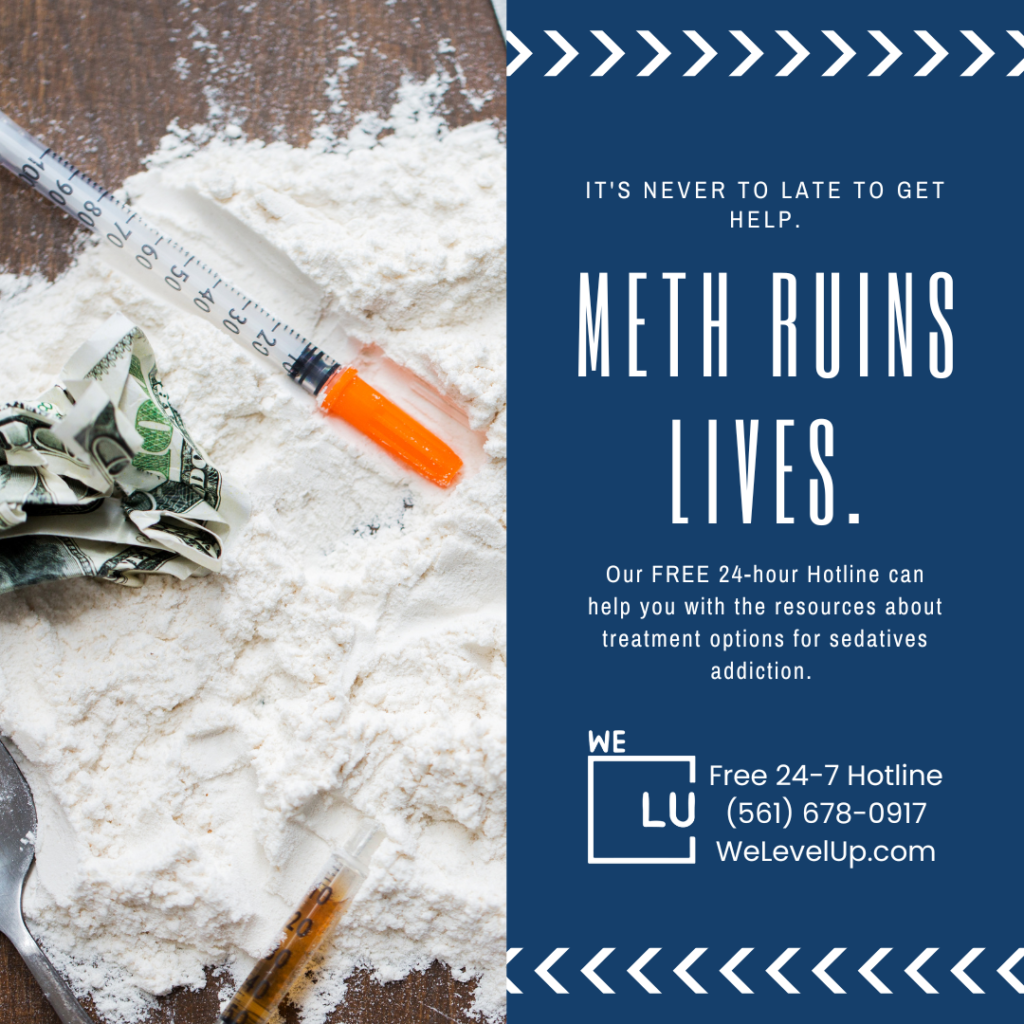
Skip To:
Learn More:
- Crystal Meth Effects: Short-Term, Long-Term & Side Effects
- What is Meth Induced Psychosis, and How Do You Treat It?
- What Are Meth Bugs, Meth Mites & Meth Sores? Meth Mites Pics. Meth Bugs Pictures. Why Do Meth Bugs & Meth Mites Occur? Meth Bugs & Meth Mites Treatment.
- How Long Does a Meth High Last? Effects Of Meth Addiction
- Meth Sores on Face and Body, Meth Sores Pics, Causes of Meth Mouth Sores, Meth Face Sores Effects, and Treatment
- Meth Drug Test FAQs. How to Pass a Drug Test for Meth?
- How Long Does Meth Stay In Your System? Meth Drug Test Detection. Crystal Meth Half-life & Treatment. How Long Does Crystal Meth Stay in Your System?
- Frightening Meth Before and After Pictures. Before and After Meth Pictures Show Horrific Devastating Changes. Watch Meth Before and After Shocking Video.
- Methamphetamine Drug Facts, Use, Effects, Abuse, & Treatment
How Long Is A Meth High? Infographic
In a recent survey of meth users, meth high was the number one reason people used meth, and coping with mental health symptoms ranked in the top three. What does meth high feel like? During the meth high, which can last anywhere from 4–16 hours, the user will start to feel a sense of power or that they’re capable of more than they are. That can manifest in sociability, as an example, but also as delusional aggression.
Often users lack any sense of self-awareness. It’s not usually until a person is in the recovery phase of their addiction that they can recognize their behaviors and the effects on the people around them.
Embed the below “How Long Does A Meth High Last?” Infographic to your website. This infographic is provided by the We Level Up addiction treatment center team. To use the below infographics, you agree to link back and attribute its source and owner at https://welevelup.com/rehab/what-does-meth-feel-like/
How Long Does A Meth High Last? Infographic image link: https://welevelup.com/wp-content/uploads/2021/10/How-Long-Does-Meth-Stay-in-Your-System.jpg
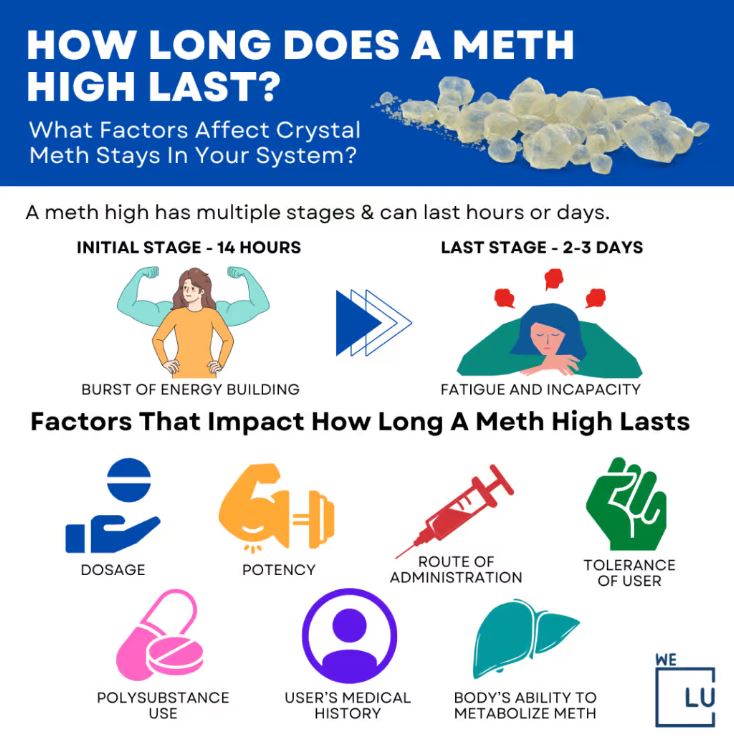
Meth Highs Fact Sheet
Tweaking From Meth
Meth use can lead to tweaking, which is very fidgety behaviors and sensations like bugs crawling on the skin. That’s why people addicted to meth often have scabs and sores on their faces and areas of their bodies.
People may report extreme paranoia, hallucinations, and delusional thinking at this level of use. They may become violently aggressive due to their psychotic symptoms.
In a recent study, 15.7% of meth users reported experiencing hallucinations long-term, even if they stopped using, and heavy meth users increased their odds of experiencing hallucinations by 50%.
These unwanted effects are why addicted people often lie, cheat, and steal. They may engage in illegal behaviors outside of drug use to get more. They usually cannot recognize the pain and harm they’re causing themselves and the people around them because of their addiction.
Someone addicted to meth or other drugs will not only lie and mislead people but may manipulate them. Someone who was once loving and caring may start to work with the people closest to them to facilitate their continued drug use. They’ll feed on the concern and love of their family members. It can take a long time before their loved ones accept that this is, in fact, manipulation.
What Does Meth Do To The Brain?
Other problems reflect significant changes in the brain caused by the misuse of methamphetamine. Neuroimaging studies have demonstrated alterations in the dopamine system’s activity associated with reduced motor speed and impaired verbal learning.
Studies in chronic methamphetamine users have also revealed severe structural and functional changes in areas of the brain associated with emotion and memory, which may account for many of the emotional and cognitive problems observed in these individuals.
Research in primate models has found that methamphetamine alters brain structures involved in decision-making and impairs the ability to suppress habitual behaviors that have become useless or counterproductive. The two effects were correlated, suggesting that the structural change underlies the decline in mental flexibility. These changes in brain structure and function could explain why methamphetamine addiction is so hard to treat and has a significant chance of relapse early in treatment.
Long Term Effects Of Meth
Long-term methamphetamine abuse has many negative consequences, including addiction to short and long-term methamphetamine effects. Addiction is a chronic, relapsing disease characterized by compulsive drug seeking and use accompanied by functional and molecular changes in the brain.
As is the case with many drugs, tolerance to methamphetamine’s pleasurable effects develops when it is taken repeatedly. Abusers often need to take higher doses of the drug, take it more frequently, or change how they take it to get the desired effect. Chronic methamphetamine abusers may develop difficulty feeling any pleasure other than that provided by the drug, fueling further abuse. Withdrawal from methamphetamine occurs when a chronic abuser stops; withdrawal symptoms include depression, anxiety, fatigue, and an intense craving for the drug.
In addition to being addicted to methamphetamine, people who use methamphetamine long-term may exhibit symptoms that can include significant anxiety, confusion, insomnia, mood disturbances, and violent behavior. They also may display several psychotic features, including paranoia, visual and auditory hallucinations, and delusions (for example, the sensation of insects creeping under the skin). Psychotic symptoms can sometimes last for months or years after a person has quit using methamphetamine, and stress has been shown to precipitate spontaneous recurrence of methamphetamine psychosis in people who use methamphetamine and have previously experienced psychosis.

Get Your Life Back
Find Hope & Recovery. Get Safe Comfortable Detox, Addiction Rehab & Dual Diagnosis High-Quality Care.
Hotline(844) 597-1011Meth Statistics
What does meth make you feel like? The drug stimulates the release of dopamine, a neurotransmitter associated with feelings of reward and pleasure, resulting in an intense and euphoric sensation. However, these initial pleasurable effects are often followed by negative consequences and potential physical and psychological health risks.
Besides the impact of meth on the users, meth use has been a problem for society and thousands of families. Methamphetamine use has had detrimental effects on communities, contributing to crime rates, strained healthcare systems, and the involvement of child protective services due to the consequences of methamphetamine addiction.
1.6 Million
In 2019, roughly 1.6 million people aged 12 or older reported using methamphetamine in the past year.
Source: NSDUH
103,000
During the same year, there were over 103,000 emergency department visits related to methamphetamine use in the US.
Source: SAMHSA
83,000
In 2020, law enforcement agencies seized over 83,000 kilograms of methamphetamine, indicating a rise in the availability of the drug.
Source: DEA
Crystal Meth High
Methamphetamine can come in several forms– tablets, powder, or crystals. Depending on its structure, methamphetamine can be swallowed, snorted, or injected. Smoking the purer, crystalline form of methamphetamine, known as crystal meth, produces a very intense high similar to that produced by crack cocaine but much longer-lasting. However, sharing needles, syringes, or other injecting equipment runs the risk of the injector catching or spreading viruses, such as HIV or hepatitis C. There is also the risk that veins may be damaged and of abscesses or clots developing.
What Does Crystal Meth Feel Like?
How does meth feel? The effects of methamphetamine can last a very long time. Smoking the purer, crystalline form of methamphetamine, crystal meth, produces a very intense high similar to that produced by crack cocaine but is much longer-lasting. The effects can last for a period of between 4 and 12 hours.
According to the general drug testing guide, crystal meth can report positive in a urine test for 1 to 4 days after use. How long a drug can be detected depends on how much is taken and which testing kit is used.
Get Help. Get Better. Get Your Life Back.
Searching for Accredited Drug and Alcohol Rehab Centers Near You?
Even if you have failed previously and relapsed, or are in the middle of a difficult crisis, we stand ready to support you. Our trusted behavioral health specialists will not give up on you. When you feel ready or just want someone to speak to about therapy alternatives to change your life call us. Even if we cannot assist you, we will lead you to wherever you can get support. There is no obligation. Call our hotline today.
(844) 597-1011What Does Smoking Meth Feel Like?
What does being on meth feel like? Smoking methamphetamine produces intense and immediate effects. When smoked, the drug rapidly reaches the brain, resulting in an intense rush of euphoria and increased energy.
Users often describe a powerful and pleasurable sensation that can be overwhelming. Smoking methamphetamine induces a sense of heightened alertness, increased focus, and heightened sensory perception. It can create a sensation of invincibility and intensified emotions. However, the pleasurable effects of smoking methamphetamine are short-lived and can quickly be followed by negative consequences and the potential for addiction.
What Does Snorting Meth Feel Like?
Snorting methamphetamine leads to a more gradual onset of effects than other administration methods. Users typically report an initial burning or stinging sensation in the nasal passages. Once absorbed, methamphetamine stimulates dopamine release, producing intense euphoria and increased energy.
What does being high on meth feel like? Users may experience heightened focus, enhanced confidence, and a sense of invigoration. However, the effects of snorting methamphetamine are temporary, and users may experience negative consequences, such as increased heart rate, elevated blood pressure, and potential long-term damage to the nasal passages.
How Is Methamphetamine Addictive?
Meth is a stimulant drug that heightens the functions of the central nervous system, thereby increasing activity in some brain regions. For example, heart rate, body temperature, respiration, and blood pressure all rise under the influence of meth.
What does doing meth feel like? Energy, attention, focus, pleasure, and excitement are also enhanced as chemical messengers in the brain, such as dopamine, are increased by the interaction of meth. Elevated dopamine levels cause the intense “meth high” associated with meth, and the desire to recreate this feeling makes the drug extremely addictive.
When someone is taking meth, they are alert and energized and can stay awake for long periods. When meth wears off, however, a significant “crash” generally occurs, leaving individuals tired, lethargic, hungry, depressed, and anxious.
As a result, meth is commonly taken in a binge pattern, often called a “run,” where small amounts of meth are taken every few hours for a couple of days to prolong the meth high. This pattern of abuse can more quickly lead to drug dependence and addiction.
First-class Facilities & Amenities
World-class High-Quality Addiction & Mental Health Rehabilitation Treatment
Rehab Centers TourRenowned Addiction Centers. Serene Private Facilities. Inpatient rehab programs vary.
Addiction Helpline(844) 597-1011Proven recovery success experience, backed by a Team w/ History of:
15+
Years of Unified Experience
100s
5-Star Reviews Across Our Centers
10K
Recovery Success Stories Across Our Network
- Low Patient to Therapist Ratio
- Onsite Medical Detox Center
- Comprehensive Dual-Diagnosis Treatment
- Complimentary Family & Alumni Programs
- Coaching, Recovery & Personal Development Events
Getting Help For Methamphetamine Addiction
What does it feel like to be on meth? People addicted to meth often think only about their subsequent drug use. They have tunnel vision because of how their brain reacts to the drug, and they crave it.
To effectively break free from meth addiction, individuals need to undergo a comprehensive treatment approach. This typically includes a combination of therapies, counseling, support groups, and medical interventions tailored to their specific needs. Addressing addiction’s physical, psychological, and social aspects is crucial for long-term recovery and establishing a foundation for a healthier, drug-free life.
We Level Up treatment rehab & detox center can provide you, or someone you love, the tools to recover from meth addiction with professional and safe treatment.
Feel free to call us to speak with one of our counselors. We can inform you about this condition by giving you relevant information.
World-class, Accredited, 5-Star Reviewed, Effective Addiction & Mental Health Programs. Complete Behavioral Health Inpatient Rehab, Detox plus Co-occuring Disorders Therapy.
CALL(844) 597-1011End the Addiction Pain. End the Emotional Rollercoaster. Get Your Life Back. Start Drug, Alcohol & Dual Diagnosis Mental Health Treatment Now. Get Free No-obligation Guidance by Substance Abuse Specialists Who Understand Addiction & Mental Health Recovery & Know How to Help.
Top 5 What Meth Feels Like? FAQs
-
How does crystal meth make you feel?
Crystal meth, or methamphetamine, can induce intense euphoria, heightened energy, and increased focus. Users may experience a surge of confidence, amplified sensory perception, and a sense of invincibility. However, the negative consequences, including agitation, anxiety, paranoia, and various physical and mental health issues, often follow these initial pleasurable effects.
-
What does it feel like to smoke meth?
Smoking methamphetamine produces an immediate and intense rush of euphoria, often described as a powerful and pleasurable sensation. Users may experience a heightened sense of energy, alertness, and intensified emotions, along with increased focus and sensory perception.
-
What does it feel like to be high on meth?
Being high on methamphetamine can induce an intense sense of euphoria and a surge of energy. Users may experience heightened focus, increased confidence, a distorted sense of time, and potential side effects such as increased heart rate, dilated pupils, and decreased appetite.
-
How does meth make you feel?
Methamphetamine can make users feel an intense rush of euphoria, increased energy, and heightened alertness. It may also lead to feelings of invincibility, boosted confidence, and intensified emotions, but negative consequences and potential long-term harm often accompany these effects.
-
What does it feel like to do meth?
Using methamphetamine can induce an immediate and intense rush of euphoria, often described as a surge of pleasure and heightened energy. Users may experience increased focus, boosted confidence, and a distorted sense of time. Still, these initial pleasurable effects are typically short-lived and can be followed by negative physical and mental health consequences.
Faces of Meth Before & After Images Devastating Effects w/ Meth Face, Meth Mouth, & Meth Sores Video
In addition to the severe psychological effects, methamphetamine abuse can take a devastating toll on the body. Prolonged use of methamphetamine can lead to various physical health complications. These can include rapid weight loss, severe dental problems (known as “meth mouth”), skin sores and infections, cardiovascular issues such as high blood pressure and increased heart rate, and damage to vital organs like the liver and kidneys. The drug’s stimulating properties can also disrupt standard sleep patterns, leading to chronic insomnia and exhaustion.
Continue to watch the video below for more information. If you or a loved one is struggling with meth addiction or other substance use disorder(s), call for a FREE consultation 24/7 at (561) 678-0917
Get FREE addiction treatment insurance check – https://welevelup.com/rehab-insurance/
Faces of Meth Before & After Images Video Transcript.
The face of meth is a term for the decline in the facial physical appearance of many meth users. Disfiguring faces of meth before and after photos show the incredible damage caused by meth abuse. Uncover the side effects of meth, signs, symptoms, and meth addiction treatment options. Learn about meth mouth tooth decay risks.
The “Faces of Meth” project was first introduced by the Multnomah County Sheriff’s Office in Portland, Oregon, in 2004. The idea behind the project was to educate the public, particularly young people, about the dangers of methamphetamine use and its potential consequences.
The photos used in the project are often shocking, as they depict individuals who have lost teeth, aged prematurely, and suffered from severe skin problems due to their drug use. Methamphetamine is a highly addictive drug that can cause many physical and mental health problems, including heart problems, increased risk of stroke, paranoia, and hallucinations.
The “Faces of Meth” project has successfully generated widespread attention and raised awareness about the harmful effects of methamphetamine use. The campaign has also been adopted by other law enforcement agencies and organizations across the country and around the world.
In addition to the images, the “Faces of Meth” campaign also features resources and information for those struggling with methamphetamine and other drug addiction, including treatment options and support groups. The project’s ultimate goal is to help prevent and reduce the harm caused by methamphetamine abuse and encourage people to seek help if they or someone they know is struggling with addiction.
Experience Transformative Recovery at We Level Up Treatment Centers.
See our authentic success stories. Get inspired. Get the help you deserve.
Start a New Life
Begin with a free call to an addiction & behavioral health treatment advisor. Learn more about our dual-diagnosis programs. The We Level Up Treatment Center Network delivers recovery programs that vary by each treatment facility. Call to learn more.
- Personalized Care
- Caring Accountable Staff
- World-class Amenities
- Licensed & Accredited
- Renowned w/ 100s 5-Star Reviews
We’ll Call You
Search We Level Up What Does Meth Feel Like? Mental Health Topics & Resources
Sources
[1] National Treatment Episode Data Set (Samhsa.gov)
[2] National Institute on Drug Abuse (Drugabuse.gov/)
[3] ‘Methamphetamine Research Report. What is methamphetamine? What Does Meth Feel Like?’ – National Institute on Drug Abuse (www.drugabuse.gov)
[4] Richards JR, Laurin EG. Methamphetamine Toxicity. [Updated 2023 Jan 8]. In: StatPearls [Internet]. Treasure Island (FL): StatPearls Publishing; 2023 Jan-. Available from: https://www.ncbi.nlm.nih.gov/books/NBK430895/
[5] Office of National Drug Control Policy (ONDCP) – Methamphetamine: https://www.whitehouse.gov/methamphetamine/
[6] National Library of Medicine – What Does Meth Feel Like?: https://medlineplus.gov/methamphetamine.html
[7] US Department of Justice – What Does Meth Feel Like?: https://www.justice.gov/
[8] US Department of Health and Human Services – Methamphetamine: https://www.hhs.gov/ash/oah/adolescent-development/substance-use/drugs/stimulants/methamphetamine/index.html
[9] National Criminal Justice Reference Service – Methamphetamine: https://www.ncjrs.gov/ondcppubs/publications/policy/ndcs03/chapter6.html
[10] US Drug Enforcement Administration (DEA) – What Does Meth Feel Like?: https://www.dea.gov/
